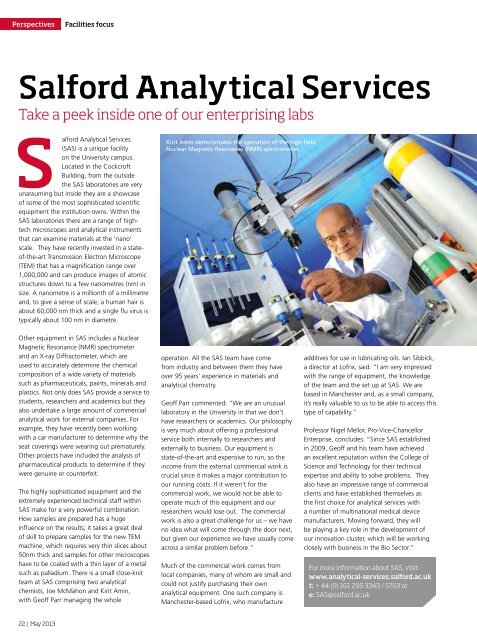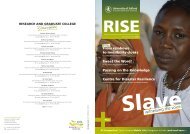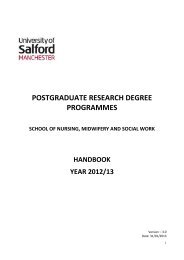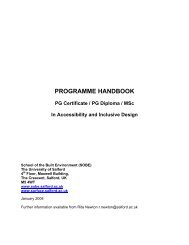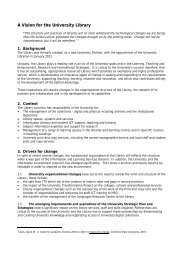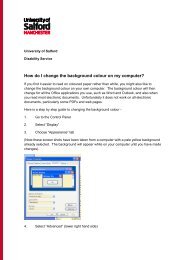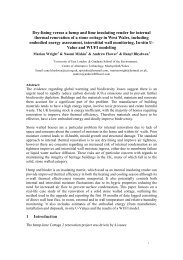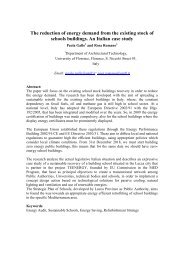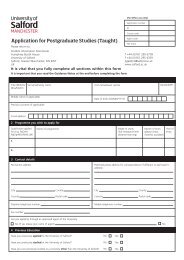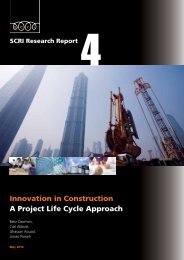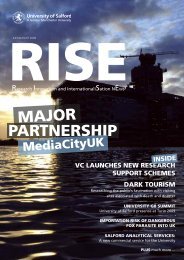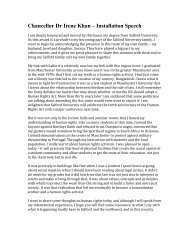Download a copy (pdf) - University of Salford
Download a copy (pdf) - University of Salford
Download a copy (pdf) - University of Salford
Create successful ePaper yourself
Turn your PDF publications into a flip-book with our unique Google optimized e-Paper software.
PerspectivesFacilities focus<strong>Salford</strong> Analytical ServicesTake a peek inside one <strong>of</strong> our enterprising labs<strong>Salford</strong> Analytical Services(SAS) is a unique facilityon the <strong>University</strong> campus.Located in the Cockcr<strong>of</strong>tBuilding, from the outsidethe SAS laboratories are veryunassuming but inside they are a showcase<strong>of</strong> some <strong>of</strong> the most sophisticated scientificequipment the institution owns. Within theSAS laboratories there are a range <strong>of</strong> hightechmicroscopes and analytical instrumentsthat can examine materials at the ‘nano’scale. They have recently invested in a state<strong>of</strong>-the-artTransmission Electron Microscope(TEM) that has a magnification range over1,000,000 and can produce images <strong>of</strong> atomicstructures down to a few nanometres (nm) insize. A nanometre is a millionth <strong>of</strong> a millimetreand, to give a sense <strong>of</strong> scale, a human hair isabout 60,000 nm thick and a single flu virus istypically about 100 nm in diametre.Kirit Amin demonstrates the operation <strong>of</strong> the high fieldNuclear Magnetic Resonance (NMR) spectrometer.Other equipment in SAS includes a NuclearMagnetic Resonance (NMR) spectrometerand an X-ray Diffractometer, which areused to accurately determine the chemicalcomposition <strong>of</strong> a wide variety <strong>of</strong> materialssuch as pharmaceuticals, paints, minerals andplastics. Not only does SAS provide a service tostudents, researchers and academics but theyalso undertake a large amount <strong>of</strong> commercialanalytical work for external companies. Forexample, they have recently been workingwith a car manufacturer to determine why theseat coverings were wearing out prematurely.Other projects have included the analysis <strong>of</strong>pharmaceutical products to determine if theywere genuine or counterfeit.The highly sophisticated equipment and theextremely experienced technical staff withinSAS make for a very powerful combination.How samples are prepared has a hugeinfluence on the results; it takes a great deal<strong>of</strong> skill to prepare samples for the new TEMmachine, which requires very thin slices about50nm thick and samples for other microscopeshave to be coated with a thin layer <strong>of</strong> a metalsuch as palladium. There is a small close-knitteam at SAS comprising two analyticalchemists, Joe McMahon and Kirit Amin,with Ge<strong>of</strong>f Parr managing the wholeoperation. All the SAS team have comefrom industry and between them they haveover 95 years' experience in materials andanalytical chemistry.Ge<strong>of</strong>f Parr commented: “We are an unusuallaboratory in the <strong>University</strong> in that we don’thave researchers or academics. Our philosophyis very much about <strong>of</strong>fering a pr<strong>of</strong>essionalservice both internally to researchers andexternally to business. Our equipment isstate-<strong>of</strong>-the-art and expensive to run, so theincome from the external commercial work iscrucial since it makes a major contribution toour running costs. If it weren’t for thecommercial work, we would not be able tooperate much <strong>of</strong> this equipment and ourresearchers would lose out. The commercialwork is also a great challenge for us – we haveno idea what will come through the door next,but given our experience we have usually comeacross a similar problem before.”Much <strong>of</strong> the commercial work comes fromlocal companies, many <strong>of</strong> whom are small andcould not justify purchasing their ownanalytical equipment. One such company isManchester-based L<strong>of</strong>rix, who manufactureadditives for use in lubricating oils. Ian Sibbick,a director at L<strong>of</strong>rix, said: “I am very impressedwith the range <strong>of</strong> equipment, the knowledge<strong>of</strong> the team and the set up at SAS. We arebased in Manchester and, as a small company,it’s really valuable to us to be able to access thistype <strong>of</strong> capability.”Pr<strong>of</strong>essor Nigel Mellor, Pro-Vice-ChancellorEnterprise, concludes: “Since SAS establishedin 2009, Ge<strong>of</strong>f and his team have achievedan excellent reputation within the College <strong>of</strong>Science and Technology for their technicalexpertise and ability to solve problems. Theyalso have an impressive range <strong>of</strong> commercialclients and have established themselves asthe first choice for analytical services witha number <strong>of</strong> multinational medical devicemanufacturers. Moving forward, they willbe playing a key role in the development <strong>of</strong>our innovation cluster, which will be workingclosely with business in the Bio Sector.”For more information about SAS, visit:www.analytical-services.salford.ac.ukt: + 44 (0) 161 295 3343 / 5703 ore: SAS@salford.ac.uk22 | May 2013


